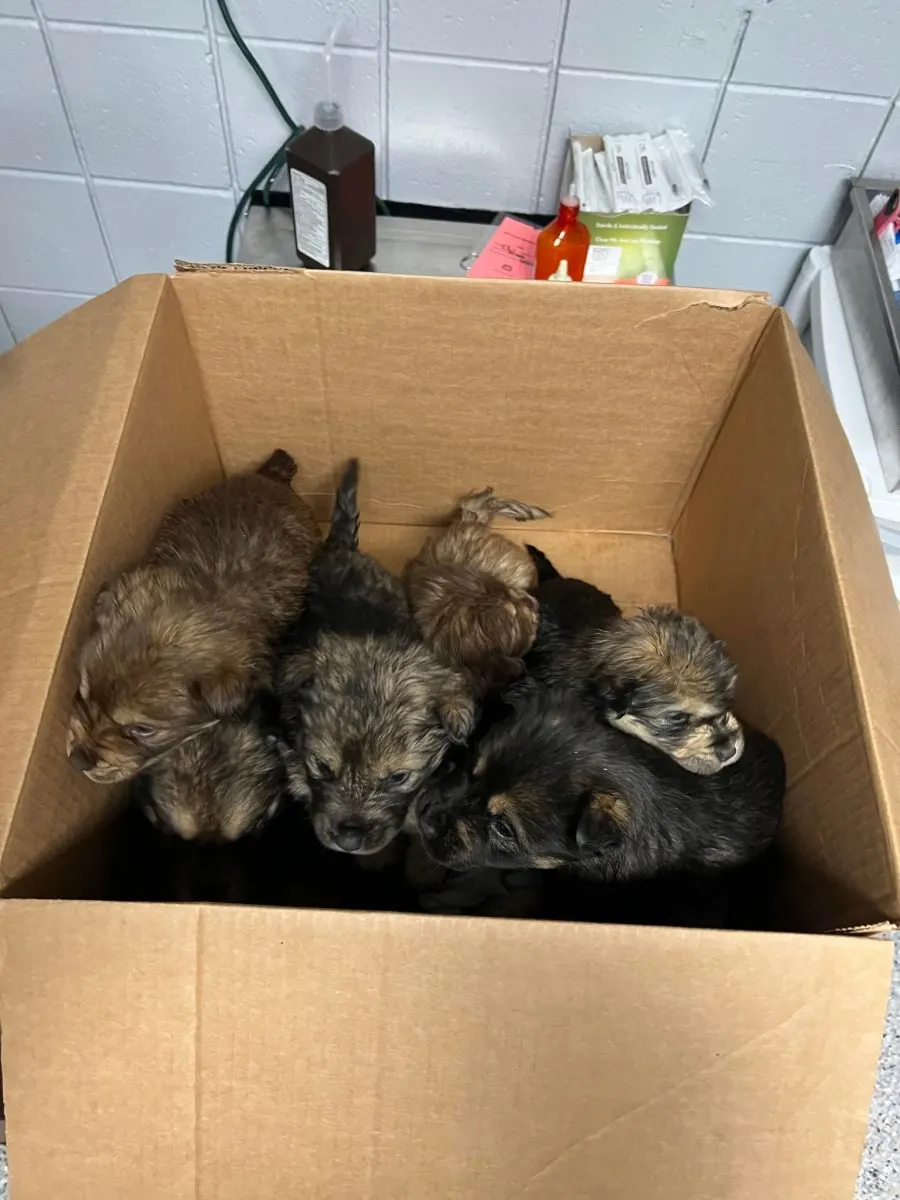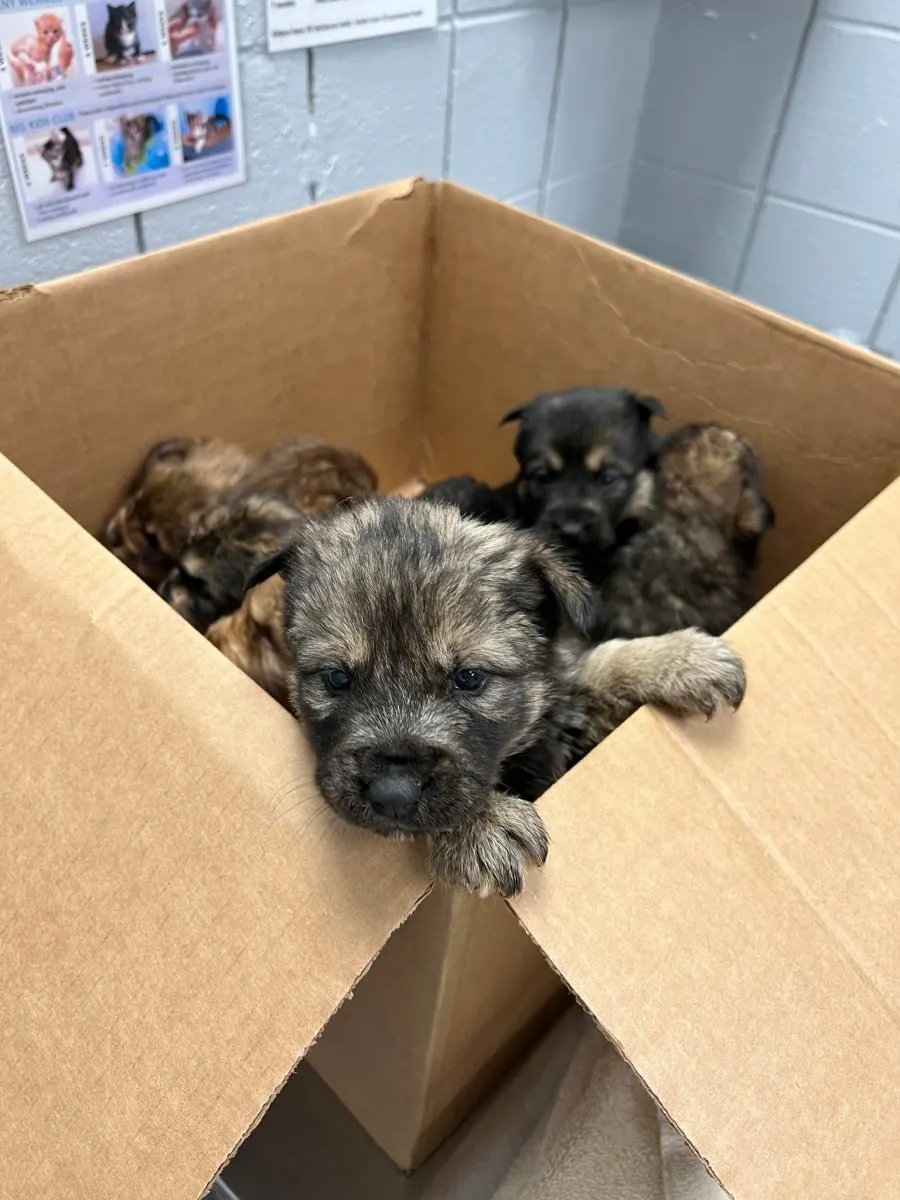My heart breaks for all the innocent animals who, despite being deserving of unconditional love, end up abandoned by their ruthless owners.
Instead of surrendering them to shelters when they can’t take care of them anymore, their families dump their faithful companions without caring if they survive or not.
I was left brokenhearted after I heard what had happened to four-week-old puppies in Michigan.
Their family was so heartless that they chose to dump them on the night of a storm. Thanks to the wonderful people who rushed to help them, their lives were saved in the nick of time.
Shivering In The Cold

On a freezing stormy night in November 2022, a group of tiny puppies was abandoned in a cardboard box in Holland County, Ottawa, in Michigan. They were terribly cold and scared of the howling winds that were so strong that they knocked down trees and moved storage containers.
As the little ones shivered in the cold, they curled up against each other to keep warm. They knew they only had each other. Their mom wasn’t there to feed them or shelter them. Because of the cruel owner, they were now outside on their own in the worst possible weather.
Luckily, a kind-hearted person found the tiny, defenceless puppies and called the police right away.
Having heard of the dangerous situation the pups were in, the Ottawa County Sheriff’s Department’s Deputy jumped into action right away. He knew that they didn’t have much time as the storm seemed to be getting worse.
He rescued the puppies and drove them to the Harbor Humane Society. The shelter staff was brokenhearted when they saw the pups. They reminded the public once again that they could always reach out to their shelter for help.
“It breaks our hearts that things happened this way… We never want to see an animal abandoned and truly will never turn away a person or pet in a real emergency, even when we are bursting at the seams,” they stated on their Facebook page.
On The Road To Recovery

When they arrived at the shelter, the little pups were freezing. Two of them were in critical condition, but they were expected to make a complete recovery.
One of the wonderful and caring staff members took those two puppies home to watch over them throughout the night and keep them warm.
Other puppies went to foster homes and their foster families cared for them and made sure they recovered completely from the terrible ordeal they had been through. They cuddled them, giving them a lot of love day after day.
The shelter staff was convinced that the little puppies wouldn’t have survived the night if their anonymous rescuer hadn’t found them.
The charming pups proved to be strong, and the love that their foster families selflessly gave them made them thrive fast. They enjoyed playing and they felt safe in the warmth of their home.

In December 2022, the sweet pups were ready for adoption and they took part at Howliday Puppy Pawty – an annual adoption event at Harbor Humane Society.
The adorable puppies, named Zeus, Oso, Bronte, Ammann, Nyx, Zane, and Eric stole many hearts at the event. They were adopted by loving families who will love them and cherish them forever. They were over the moon to leave the shelter in the arms of their proud parents.
We are thrilled that all the pups found their happily ever after, and we hope that all other shelter animals will find the loving home they deserve.
If you’ve ever noticed your furry companion panting heavily, you might wonder what’s going on. Dogs pant for various reasons, and understanding why they do it can help you ensure your pup’s well-being. It’s a common behavior that can signal excitement, anxiety, or even a way for them to cool down when they’re feeling warm.
Panting is a natural way for dogs to regulate their body temperature, especially since they can’t sweat like humans do. Whether it’s after a play session, during a car ride, or when they’re feeling a bit stressed, panting is your dog’s way of communicating with you. So, next time you see your dog panting, remember, it’s more than just a sign of tiredness – it’s their way of telling you how they’re feeling.
Understanding Dog Panting
The Basics of Canine Panting
When your dog pants, it’s their way of cooling down as they don’t sweat like you do. Panting helps them regulate body temperature by releasing heat through the evaporation of moisture in their breath.
How Panting Helps Dogs Regulate Their Body Temperature
Dogs rely on panting to maintain a safe body temperature. This process allows them to exchange warm air from their bodies with cooler air from the environment. Picture it as a natural cooling system that kicks in when they need it most.
Common Reasons Dogs Pant
Physical Activity and Excitement
When your dog engages in physical activities like running, playing fetch, or simply getting excited, panting is a common response. It helps them regulate their body temperature when their activity level increases, allowing them to cool down efficiently.
Heat and Humidity
Warm weather or high humidity can cause dogs to pant more than usual. Dogs have a limited ability to sweat, so panting becomes crucial in releasing excess heat. Providing shade and keeping them hydrated can help alleviate panting in hot and humid conditions.
Stress and Anxiety
Just like humans, dogs may pant when they feel stressed or anxious. Situations such as thunderstorms, separation anxiety, or visits to the vet can trigger panting as a coping mechanism. Understanding your dog’s triggers and providing a calming environment can help reduce stress-related panting.
Remember, observing your dog’s panting behavior and identifying the potential reasons behind it can help you better care for your furry companion.
When Is Panting a Cause for Concern?
Signs of Excessive Panting
Excessive panting in dogs can be a sign of an underlying issue that requires attention. If you notice your furry friend panting heavily without engaging in strenuous activities or being in a hot environment, it could indicate a potential problem. Keep an eye out for other accompanying symptoms like lethargy, coughing, or difficulty breathing, as these could indicate a more serious issue that needs veterinary care.
Panting in Older Dogs
As dogs age, their panting patterns may change. Older dogs may pant more frequently or for longer periods, which could be due to various reasons such as decreased lung capacity, arthritis pain, or underlying health conditions. While some panting is normal, excessive panting in senior dogs should not be ignored. Monitor your older dog’s panting habits and consult with your vet if you notice any sudden or concerning changes.
Health Issues Related to Excessive Panting
Heart Problems
Excessive panting in dogs can sometimes indicate underlying heart issues. Conditions like heart disease or congestive heart failure can lead to increased panting as the heart struggles to pump blood effectively. If you notice your dog panting excessively, especially along with symptoms like fatigue, coughing, or decreased appetite, it’s crucial to consult a veterinarian promptly. Proper diagnosis and treatment are essential to manage heart-related concerns in your furry friend.
Respiratory Disorders
Respiratory disorders are another potential cause of excessive panting in dogs. Issues such as pneumonia, bronchitis, or collapsing trachea can affect your dog’s ability to breathe efficiently, leading to increased panting. If your dog shows signs of labored breathing, wheezing, or bluish gums along with excessive panting, it’s vital to seek veterinary help. Prompt identification and treatment of respiratory conditions can improve your dog’s quality of life and overall well-being.
Pain and Discomfort
Dogs may pant excessively when experiencing pain or discomfort, whether it’s due to injuries, arthritis, or other health issues. Pain-induced panting can manifest as rapid, shallow breaths, signaling distress. If you observe your dog panting heavily while displaying signs of discomfort like limping, whining, or reluctance to move, it’s essential to address the underlying cause. Consulting a veterinarian can help determine the source of pain and implement appropriate pain management strategies for your canine companion.
Diagnosing Excessive Panting
When to Visit the Vet
If you notice a sudden increase in your dog’s panting without any clear reason like exertion or heat, it’s essential to schedule a vet visit. Excessive panting can be a sign of an underlying health issue that needs prompt attention. Watch out for other symptoms like coughing, fatigue, or labored breathing, as these could indicate more serious conditions requiring professional diagnosis.
What to Expect During the Examination
During the vet examination for excessive panting, your vet will likely conduct a thorough physical examination of your dog. They may listen to the heart and lungs, check for any abnormalities, and ask questions about your dog’s behavior and overall health. Be prepared to provide details about your dog’s panting patterns, any accompanying symptoms, and any recent changes in their routine or environment. In some cases, the vet may recommend further tests such as bloodwork, X-rays, or ultrasounds to determine the underlying cause of the excessive panting.
Remember, early detection and treatment of the underlying cause of excessive panting are vital for your dog’s well-being. Trust your vet’s expertise and follow their recommendations to ensure your furry friend receives the care they need.
Managing and Treating Excessive Panting
Providing a Cool Environment
Help your dog beat the heat by ensuring a comfortable environment. Keep your home cool, especially in hot weather, with adequate ventilation and access to shade. You can use fans or air conditioning to help regulate the temperature. Offer fresh water regularly to keep your dog hydrated, as panting also contributes to water loss.
Anxiety Relief Strategies
If your dog is anxious, try to create a calm and secure space for them. Provide a quiet area where they can retreat, away from noise and commotion. Consider using calming aids like pheromone diffusers or soothing music to help relax your furry friend. Regular exercise and mental stimulation can also reduce anxiety levels and alleviate excessive panting.
Medical Interventions
In cases where excessive panting persists or is accompanied by other concerning symptoms, consult your veterinarian promptly. Your vet will conduct a thorough examination to identify any underlying health issues causing the excessive panting. Depending on the diagnosis, medical interventions such as medication, breathing treatments, or surgery may be recommended to manage your dog’s condition effectively. Follow your vet’s guidance closely to ensure the best care for your beloved pet.
Conclusion
Your dog’s panting serves various purposes, from cooling down to expressing emotions. However, excessive panting could signal underlying health issues that require attention. Monitoring your furry friend’s panting habits and seeking prompt veterinary care, especially for senior dogs, is crucial. When dealing with excessive panting, focus on creating a comfortable environment, using calming techniques for anxiety, and following your vet’s recommendations for treatment. Remember, understanding your dog’s panting behavior and addressing any concerns promptly can help ensure their well-being and happiness.
Frequently Asked Questions
Why do dogs pant?
Dogs pant to regulate their body temperature and express emotions like excitement or anxiety.
What does excessive panting indicate?
Excessive panting can indicate underlying health issues such as heart problems, respiratory disorders, or pain.
Why is monitoring panting patterns important?
Monitoring panting patterns is important to detect any changes that may indicate health issues, especially in older dogs.
How can excessive panting be managed?
Excessive panting can be managed by providing a cool environment, addressing anxiety with calming techniques, and seeking veterinary care when necessary.
[no_toc]

Hey there, I’m Janet Brooks, a dog-loving student from California. I’m all about helping pups in need, especially those without homes. Me and my awesome friends work together to give shelter and love to stray dogs. Oh, and I also write blogs about dogs to share helpful info.